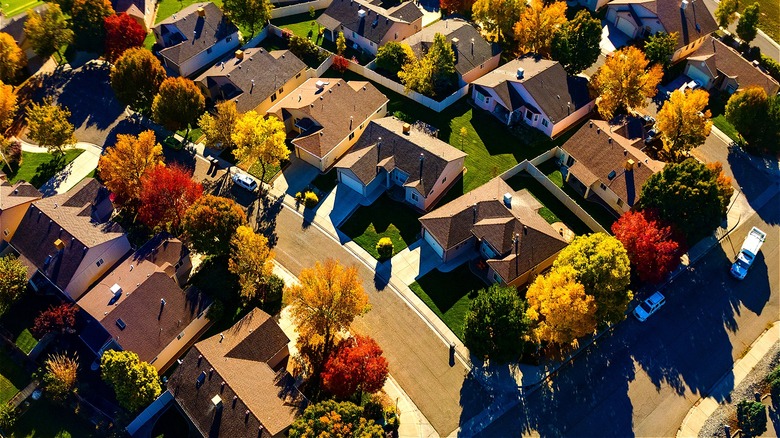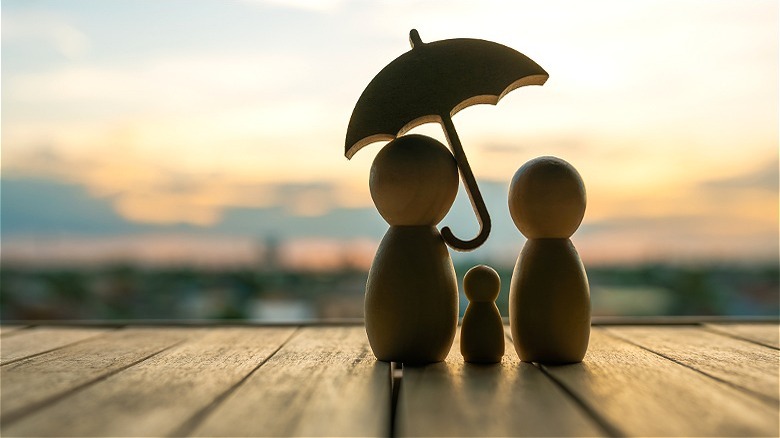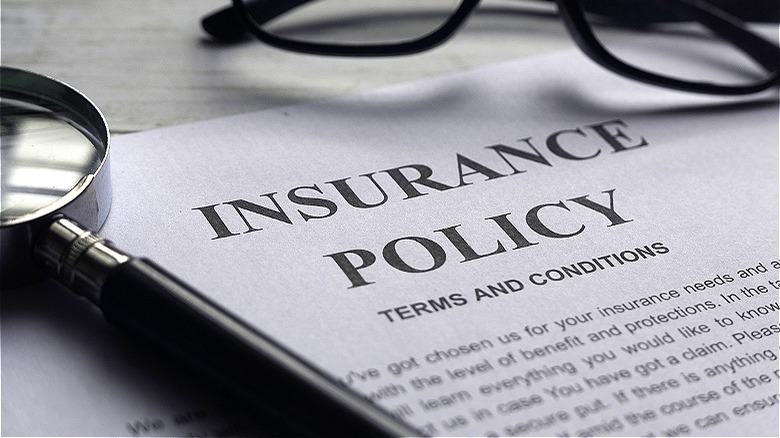Financial Traps Keeping You In The Middle Class
The middle class occupies a bizarre space in the American financial landscape. It's something those struggling financially aspire to rise up into, and it's a designation many people enjoying high salaries and thriving savings portfolios still consider themselves a member of (U.S. millionaires often classify themselves as "middle class" when asked). It's entirely likely you belong to the middle class because of how sizable the designation has become.
Generally speaking, routine budget stability is a good marker of the middle class. If you can make ends meet, on the whole, you fall into this category. But simply maintaining bills and staying afloat financially isn't a position anyone truly envies. The dream is to become self-sustaining, to vacation in fantastic destinations every year, and perhaps buy a new car or to fly in business class whenever you step foot in an airport, right? What it means to rise above the middle class will look different for everyone, but the traps that hold you back personally from escaping the hamster wheel are actually quite similar to those ensnaring everyone else who fits this generalized definition, too.
Rising out of this category and seizing true financial stability for yourself demands discipline and a long vision underscored by a solid plan. But the tools that are required to accomplish this goal aren't secret or hard to leverage. With these traps in mind, you can begin to build a plan that sets you on a new path to financial well-being.
Failing to invest in your future
Bill Gates once said, "If you were born poor, it's not your mistake. But if you die poor, it's your mistake." Gates' assertion, and the chorus of voices that suggest similar language in relation to the decision — or indecision — to invest centers primarily around retirement planning. Investing in your retirement isn't the only thing at play here, though. Saving and investing for the future, both long- and short-term, is a crucial skill everyone will need to learn for themselves.
The willpower and discipline required to set cash aside doesn't come naturally to most; however, once you incorporate it into your budgeting practices — you'll never look back. Sadly, according to a Bankrate study on retirement savings from September 2023, 56% of Americans say that they're not on track to retire comfortably. Admittedly, "comfortable" looks different to everyone, but this stark reality should act as a financial warning to anyone hoping to make their own comfortable future anything more than a fleeting dream that's never realized.
Whether it be saving for retirement or putting aside money for a down payment on your first home, the sooner you start prioritizing these investments in your future, the faster you'll realize them in real life. Fortunately, it's never too late to start making a change to your financial picture and get beyond where you are in the present. If you aren't already investing for the future, take time today to retool your budget and make space for this crucial action item.
Believing hard work equals success
It's all too common to hear people speak about the relationship between working hard and enjoying financial success (and successes in other areas of life, too). Hard work certainly plays its part in most success stories, but it's not the only factor to consider. When thinking about leaping out of the middle class, many people have come to the false belief that if they just work harder, then they'll achieve the financial breakthrough they so desperately want to experience. An even more harmful vision of this relationship follows roughly the inverse. Instead of one begetting the other, some have come to the conclusion that their lack of financial success is a direct result of not working hard enough.
This idea that working harder translates into greater financial security misses some key features of the realities of money management. If you're not investing in your future — and therefore growing your wealth exponentially with the help of compounding interest opportunities — looking for ways to climb the corporate ladder and boost your salary, and networking with mentors and colleagues to expand your possibilities, you're just running in place, regardless of how fast your feet are moving.
Forgetting to build an emergency fund
Cash reserves will keep you afloat when times get tough. If you haven't yet built an emergency fund, when the time comes when you need to rely on financial support systems, they simply won't be there. Instead, you'll fall back on lending products or credit cards that lead to even greater debt and lengthy repayments. An emergency can leave you in a hole that takes years to climb back out of if you aren't properly prepared.
Middle-class individuals generally enjoy the ability to manage their existing financial obligations. However, new emergency spending or a change in circumstance that sees added recurring payment obligations can drastically shift this balance. An emergency can occur at any time, and they often require some sort of financial output.
On rare occasions, an emergency will simply take up your time. Yet, time-consuming demands will take you away from work, exerting a different sort of negative financial influence in the process. To avoid the long and hard road of financial recovery after an emergency-spending situation, you need to build an emergency fund to fall back on when a setback inevitably takes place in your life.
Accepting debt as a part of life
Many people in the middle class live with the false notion that debt can't be avoided, and that it's simply a part of life that we all must deal with in perpetuity. Investment advisers and other financial experts often rally against the use of lending products in all but the most specific circumstances. For example, a mortgage is almost entirely unavoidable for most home buyers. Around 60% of homes in the United States today are owned with the help of a mortgage, according to Bloomberg, (this takes into account all homes, including those with owners who have remained in the property for many decades).
The prevalence of lending products in real estate can lead to an intellectual bleed-over that makes people complacent when it comes to other borrowing products. For example, while using rewards credit cards can provide a solid financial benefit to smart cardholders, the truth is, debt on the whole doesn't have to be something you deal with on a regular basis. You don't have to rack up large credit card bills that roll over from month to month and accrue gigantic heaps of interest in the process.
In fact, this very concept leads to another trap that middle-class Americans often fall into. Living beyond your means is something easily achievable when accessible lending products make their way into your life. In order to live with any financial stability, fighting back against these two traps is essential.
Sleeping on insurance coverage
Some insurance products are a waste of money, but this doesn't mean that all insurance coverage is therefore worthless. Car insurance is a requirement for anyone hoping to drive around their town, for instance. Similarly, health care coverage and life insurance can act as crucial backstops in the event of a health-related emergency or even the sudden death of a household contributor.
There's a wide variety of insurance products available out there, so it can be difficult to parse the policy options that make sense from those that might not be worth their cost. But the reality is that adding insurance coverage to your financial picture can make the difference between shouldering an emergency situation on your own and leaning on a dedicated solution that's purpose-built to handle these kinds of issues. For example, coverage to support you if you're unable to work due to an illness or injury can mean the difference between maintaining your mortgage or rent payments and losing your home or falling impossibly behind on bills and credit card payments, or smooth sailing while you recover.





